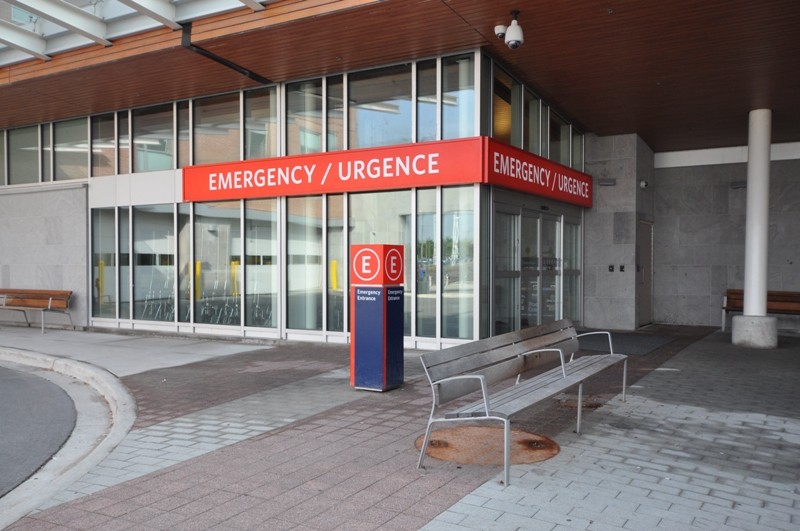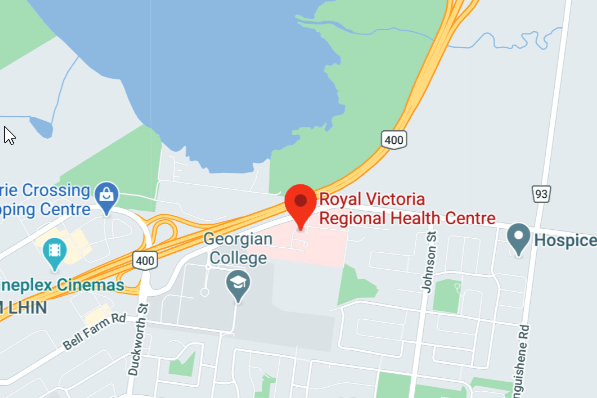RVH Emergency Department
RVH’s Emergency department is very busy place treating hundreds of patients every day. Emergency department visits usually happen unexpectedly. It is important to remember to bring a valid health card and any current medications with you. When you arrive, you will be assessed by a nurse. Please remember, the most serious patients are treated first.
There are four care areas in the ED. Patients are placed in each area according to their particular health needs. Care areas may have stretchers or recliner chairs.
There will be times when your visit to the ED may take several hours, especially when the department is extremely busy and dependent on tests that may be needed.
The ED cares for patients whose health problems need immediate attention and cannot wait to be seen by a family doctor throughout Barrie and surrounding communities.
To support you, RVHs Emergency department team consists of:
- Doctors
- Nurses
- Clerical/support staff
- Crisis/social workers
- Volunteers
- Other health professionals
During your visit, you may also see students/residents who are completing a crucial part of their education; gaining real-life experience with real patients. They are always closely supervised according to their level of experience.
Have your health card ready and be prepared to speak with a pre-triage screening nurse.
You will be called by name to the Triage desk
- An assessment of your illness or injury will be done by a Triage Nurse. The nurse will assess the urgency of your condition and assign you a priority level that will assist in determining the order in which you will be seen. The triage score is derived from a standardized, evidence-based approach that is uniform across the province, and most of Canada
- The nature of emergency care means that patients cannot be seen on a first come first serve basis, but rather according to the severity of their illness relative to other patients in the Emergency department.
- Following your assessment at the Triage desk, a chart will be made. After completion, you will either be assigned a bed or be asked to wait in the waiting area. If your condition changes while you are waiting, please inform the nurse at the triage desk/waiting room
- Once an exam room becomes available in your area, you will be brought in and a primary nurse will ask you more detailed questions about your health concern. The nurse and an Emergency Physician will examine you and assess your condition.
- Health Card (OHIP Card)
- Photo ID that includes your current address
- Your current phone number, if you have one
- List of your allergies and any medications that you are on
- Next of kin (if possible, have a family member or next of kin with you at your visit for support)
- Parents: When bringing your child to the ED, if possible please bring enough snacks, drinks, bottles, diapers, your child’s favourite toy, and activities or your child as they may be here for some time depending on their condition and course of treatment.
When accompanying an elderly patient/or meeting them at RVH, please ensure you bring warm clothes, coat and shoes as often times patients arrive by ambulance and don’t have the necessities to go home after discharge.
- The Emergency Department may appear quiet in the waiting room, but it may be very busy in the area where patients are being treated. We do our best to care for you as quickly as possible. Your co-operation helps us provide more timely care.
- The Emergency Department does not operate on a first come, first serve basis. All patients are seen by a triage nurse and assigned a triage level based on the Canadian Triage Acuity Scale (CTAS). Patients are seen in the order of their triage level, not based on time of arrival. This Triage approach allows us to give priority to those patients whose ailments are most severe and acute
Waiting:
- You may experience a wait time during your Emergency Department visit. Please be patient. Your health and safety are very important to us
- If your condition changes or worsens, please tell a nurse (at Triage, in the Waiting Room or your Primary Nurse)
- You may require diagnostic images (CT scan, x-ray, MRI, ultrasound), blood tests or other services as part of your treatment. There may be a wait for these services.
- You may be required to see a specialist doctor in addition to the emergency doctor. Please note that you may need to wait for these services.
- Your doctor will write a set of orders to tell the staff what the reason and plan for your admission is. This will include any tests or treatments to be undertaken while at RVH.
- A staff member will inquire about your preferred type of accommodation if there is an option available. You may be asked about any supplemental insurance that you have (for semi private or private room etc). Private or semi-private rooms cannot be guaranteed, even if you have coverage.
- You will be moved to your assigned room as soon as possible. If the health centre is full, there may be delay in leaving the ED and receiving an inpatient bed.
- Patients who require admission to the hospital may be required to stay in the ED until a bed becomes available.
Before you leave, members of our health care team will give you important information about your diagnosis, medications, community support services and instructions on caring for yourself at home.
After you leave RVH, we recommend you:
- Follow any instructions provided
- Take medications as directed
- Seek community support services as recommended
- Return as arranged for any follow up appointment or clinic visits
- Follow up with your family physician to ensure you have made a full recovery
Note: There may be costs billed directly to you as a result of our visit which are not covered by OHIP. You may be billed for such items as ambulance, crutches, braces, and medical devices that are necessary for your care
- You will be asked to limit visitors to one at a time in the ED. This helps to ensure the ED staff have enough space to perform their duties quickly and maintain privacy for all patients
- If you or a family member has a question or concern about the care you are receiving, please speak to a healthcare professional during your stay. Your opinions are important to us and we want to give you the best possible care
- Parking information and rates
Contact Number & Hours of Operation
Phone: 705-728-9802 x46611
Hours: 24 hours a day, 7 days a week
Resources:
- Community Resources – 211
- Health Connect Ontario – 811
- Canadian Mental Heath Association (CMHA) : 1-866-531-2600
- Poison Control: 1-800-268-9017
- Barrie and Area Victim Crisis Assistance and Referral Services 705-725-7025 Ext 2120
Shelters:
- Women’s and Children’s shelter of Barrie – 705-721-9977
- The Salvation Army Bayside Mission Centre – 705-728-3737
- David Busby Centre – 705-739-6916
Additional Resources in the ED
The Emergency Department is staffed at all times by specially trained emergency physicians, nurses, clerks and allied health professionals.
You may also see:
Geriatric Emergency Management (GEM) Nurses – For patients over the age of 65, a specialized frailty-focused nursing services exists in our Emergency Department. The GEM team provide geriatric assessments for physical, mental and functional abilities with a goal to enhance the patient’s daily living in the community to maintain their independence.
Crisis Services – RVH’s Crisis Team provides 24/7 services to the Emergency Department.
Other services you may see are:
- Volunteers
- Discharge planners
- Respiratory Therapists (RTs) – for health teaching and home oxygen assessments
- Pharmacy Technicians doing medication reconciliation
- Diabetic Educators
- Dieticians
- Security
- Language interpretation (24 hours a day/7 days a week) can be arranged
- Spiritual Care (24 hours a day/7 days a week) can be arranged
What is a Level III Trauma Centre?
A Level III Trauma Centre is an acute care hospital that has the ability to manage and provide quality care for patients generally suffering from a single-system injury as well as triage and stabilize multisystem injury patients for transfer to a Lead Trauma Hospital (Level I/II Trauma Centre).
The Trauma program is new, we are learning and growing the program together. This means we are reviewing and incorporating best practices and guidelines of trauma care to our patients. The Trauma Program involves front line staff from doctors, EMS, police, nurses, RRTs, MRTs, clerks, support staff and many more RVH staff. The program also includes two Co-Medical Directors, a Trauma Coordinator and a Data Analyst.
The Level III Trauma Centres will play a more established role within the RTNs. In collaboration with RTNs and Lead Trauma Hospitals, the Level III Trauma Centres will:
- Treat and safely manage injured patients according to current services and triage and stabilize multi-system injury patients for transfer to the Lead Trauma Hospital;
- Participate in quality improvement initiatives, such as education and outreach;
- Participate in injury prevention initiatives through the RTNs;
- Implement best practices to safely treat and manage injured patients.
- Partner with system providers, such as EMS, Ornge, etc. to identify other roles/responsibilities to support the care of injured patients; and,
- Participate in entering data into the Ontario Trauma Registry to support performance management.
These Level III Trauma Centres already care for a volume of injured patients. With programmatic supports to ensure care consistently delivered according to best practices and a mechanism to describe this by contributing data to the provincial trauma data set, these Level III Centres begin to further shape an inclusive trauma system for Ontario. The funding will allow these centres to establish and maintain programmatic supports to address the following trauma system needs:
- Opportunities to improve coordination of patient care and services between Lead Trauma Hospitals and Level III Trauma Centres;
- Improve Level III Trauma Centres’ access to trauma-specific education, coordinated injury prevention and mass- casualty planning: and,
- Enable more comprehensive data capture and system planning for injured patients in Ontario with the participation of the Level III Trauma Centres in the Ontario Trauma Registry.
Step-by-step Directions
Before Leaving Home:
Please bring a list of all the medications you are currently taking, and any allergies that you might have to the Emergency department.
Street: 201 Georgian Drive (Emergency entrance)
Travelling on Georgian Drive you will pass Georgian College and enter RVH through the SECOND ROAD ENTRANCE.
Patient Drop-Off: Emergency
Proceed FORWARD after stopping at the stop sign. FOLLOW the road to the Emergency department entrance.
- You will pass Emergency parking on your right
Parking: Emergency
From the Emergency Patient Drop-off TURN LEFT. After stopping at the stop sign TURN LEFT, the Emergency parking lot is ON YOUR RIGHT.
Entrance: Emergency
After parking enter RVH’s Emergency department walking towards the Emergency Patient Drop-off.
While in the Emergency:
Please do not eat or drink anything unless a doctor or nurse tells you that you may. An empty stomach is required for surgery
and for certain tests. Please check with your nurse before you go to the bathroom as samples may be required for testing.


